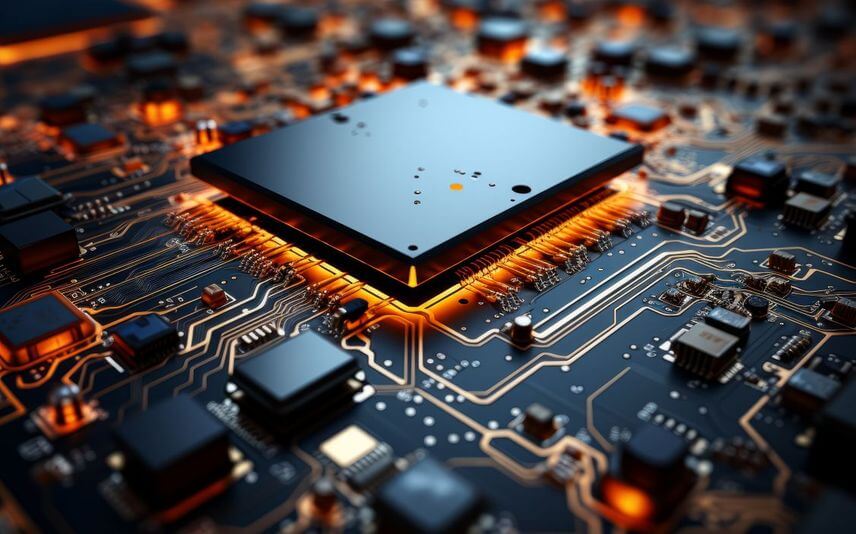Malaysia has officially stepped into the AI hardware arena with the development of its first domestically designed artificial intelligence device chip. This marks a pivotal moment for the nation as it seeks to strengthen its position in the global semiconductor supply chain and capitalize on the growing demand for AI technology.
The MARS1000: Malaysia's Pioneering AI Chip
SkyeChip, a local chip design firm, unveiled the MARS1000 processor, an edge AI processor, at a recent industry event. While not as powerful as the advanced AI chips from companies like Nvidia that are used in data centers, the MARS1000 represents a significant stride for Malaysia, signaling its ambition to play a larger role in the global AI ecosystem. Edge AI processors like the MARS1000 are designed to perform AI computations directly on devices, enabling real-time analysis and decision-making without relying on a centralized cloud server. This is crucial for applications requiring immediate responses, such as autonomous vehicles, robotics, and industrial automation. The chip is designed to power applications such as automotive systems and robotics.
Malaysia's Broader AI Strategy
The development of the MARS1000 is not an isolated event but a strategic component of Malaysia's broader national agenda to become a significant player in the global AI landscape. In late 2024, Malaysia launched the National AI Office, a government agency tasked with driving the nation's AI strategy. The National AI Office (NAIO) is developing a national AI strategy rooted in Malaysia's values, voices, and lived experiences with the aim of delivering real impact to businesses, communities. The priorities span seven areas, including boosting AI adoption, creating regulatory frameworks, and establishing standards for AI ethics. Malaysia's AI governance focuses on creating a framework that ensures responsible, transparent, and ethical AI development and deployment.
The strategic pillars of Malaysia's AI Roadmap 2021-2025 include innovation and research, talent development, infrastructure and ecosystem, and ethical AI and governance. The government has committed substantial resources, pledging at least 25 billion ringgit ($6 billion), to support semiconductor development and AI infrastructure.
Ambitions and Challenges
Prime Minister Anwar Ibrahim has been pushing to grow the country's share of the lucrative front-end wafer fabrication, as well as research and development of future technology. Malaysia aims to become a key global hub for energy and semiconductor manufacturing by 2025, driven by strong investments and economic growth projections. The country is positioning itself as a growing destination for foreign investment, sustained by a stable currency, improving economic growth, and a favorable business environment.
Malaysia's progress comes amid heightened geopolitical tension surrounding AI chip access. The U.S. government has proposed curbs on AI chip flows to Malaysia and Thailand, citing concerns over illegal re-exports to restricted destinations. In response, Malaysia has tightened export controls and reaffirmed its commitment to compliance in cooperation with U.S. technology firms. The Ministry of Investment, Trade and Industry introduced new regulations requiring trade permits for U.S.-made AI chips.
Partnerships and Investments
Malaysia is actively seeking partnerships with international technology leaders to foster knowledge exchange and access to cutting-edge AI technologies. Partnering with U.S. technology leaders is crucial for Malaysia's AI Roadmap 2021-2025, offering access to cutting-edge AI technologies and fostering knowledge exchange. In March 2025, Malaysia signed an agreement with Arm Holdings Plc to gain access to the UK-based firm's design library, aiming to produce its own chips within the next decade. The partnership with Arm will also facilitate the development of locally designed semiconductor products, advancing the nation's goal of producing more advanced chips in Malaysia.
Moving Up the Value Chain
For decades, Malaysia has been a key player in chip packaging and testing. The country contributes about 13 percent of the world's semiconductor testing and packaging. Malaysia's semiconductor exports were robust in 2024, reaching approximately 575 billion ringgit, or US$130 billion. However, the launch of the MARS1000 signals a shift in national ambition, from back-office support to front-line innovation. The National Semiconductor Strategy (NSS), launched in 2024, aims to elevate Malaysia's semiconductor industry through strategic initiatives.
Looking Ahead
As Malaysia takes its first steps into AI chip design, the MARS1000 may represent more than just a technological milestone—it could signal the beginning of a new chapter in the country's ambitions to become a serious player in the AI-driven future. The development of the MARS1000 processor by SkyeChip serves as a tangible outcome of this national drive, showcasing Malaysia's ability to move beyond mere adoption to actual creation in the AI domain.















